- Home
- Ben Counter
Seventh Retribution Page 4
Seventh Retribution Read online
Page 4
Filthammer did not reply. His mandibles chittered and lapped, as if he were trying to think up a reply. Perhaps, without his mind dulled by the psychic wards built into the brig, he would have come up with something.
‘How came you to be on Opis?’ said Deiphobus.
‘The warp willed me into being,’ said Filthammer. ‘I was born from the mud of the ocean floor.’
‘You were a man,’ retorted Deiphobus.
‘I hatched from the belly of a virgin maid.’
‘You were a man. Nothing more. How came you to Opis?’
‘The ordure of this city flowed into the lowest clogged pits of its sewers and there I emerged, congealed from their leavings as worms in meat–’
‘You are boring me, whelp!’ snapped Deiphobus. ‘Why always the same charade?’ The Librarian unclasped the gauntlet from his left hand and pulled it away. He placed his bare hand on the bristly forehead of Janeak Filthammer. The one-time champion of Chaos tried to recoil, but his chains gave him no range of movement to avoid Deiphobus’s hand.
Flesh smoked. The most appalling smell of burning filth filled the cell. Filthammer’s mandibles yawned open and he let out a rattling, gargling sound, perhaps the closest his physiology could make to a scream. Deiphobus’s fingers sank into the flesh of his forehead, the corrupted skin blistering and peeling away.
Deiphobus’s teeth gritted. The metal walls of the cell buckled and warped.
‘What you will not tell me,’ he grimaced, ‘I will tear from your mind.’
Deiphobus’s mind was a carefully prepared place, a battlefield built to give the advantage to his own consciousness when arrayed against an enemy. That enemy was the mind of Janeak Filthammer, and in the psychic concept that Deiphobus had prepared, Filthammer appeared as a great seething horde, a crawling darkness. Isolated memories stood like banner bearers or generals, with cavalry darting and writhing on the flanks and masses of barely-formed infantry flowing into the enormous banks of dark filth that heaved in the centre.
Deiphobus had spent endless sessions of meditation preparing his own mental army, visualising every component. Rogal Dorn himself stood at their head. A legion of shining, gilded Imperial Fists marched alongside him. Deiphobus had memorised the faces of the Chapter’s long-dead, resurrecting them in his mind to give his mental defences and psychic probing a concrete form.
Rogal Dorn motioned for the charge. The gilded legion stormed into the mass of Filthammer’s corrupted mind, silver blades cutting through the darkness. With every pace, Deiphobus cut deeper into Filthammer, peeling back the layers of defences and laying bare the secrets he now fought to preserve.
In another part of Deiphobus’s mind, carefully separated from the conflict by a great battlement modelled after the defences of Terra which Dorn himself had designed, Filthammer’s memory fragments played out as if projected onto a bank of pict-screens. Deiphobus discarded those which were irrelevant – insane revels, mad rantings, dark rituals to reanimate dead followers or mutate living ones. They had little more value than to illustrate what the Imperial force on Opis already suspected – Chaos demagogues and champions had been here for some time, marshalling the resources to operate in safety for perhaps decades.
Several fragments were assembled by Deiphobus’s mind into a sequence showing Filthammer’s arrival. A derelict ship, its crew dead by plague, drifted as if by accident (but most definitely by design) into Opis’s orbit. A salvage crew had brought a strange, biomechanical container to the surface, hoping it was some piece of valuable archeotech. It was, in fact, the cocoon Filthammer had extruded around himself. He had promised to teach the crew of this Chartist craft the secrets of immortality, as he had demonstrated to them by surviving extremes of vacuum and supposedly mortal wounds. Instead, he had repaid them for passage on their ship by seeding it with fatal diseases and setting the ship to drift to Opis. The space lanes of the Imperium were full of such tales.
More interesting was why. Filthammer had not chosen Opis by accident. He had been called. Deiphobus strove to find out just why he had come, out of all the millions of planets in the Imperium, to this one.
The army of his mind was tearing through Filthammer. The champion’s mind was a foul place, crammed with memories and instincts, beliefs and perversions, which gave birth to a legion of ill-formed horrors. Deiphobus joined his warriors on the battlefield, drifting like an astral projection through the carnage until he found a place in Filthammer’s mind that did not fight – hardened, calloused, a rigid caul of gnarled emotion thick enough to withstand the rest of the champion’s soul tearing at it.
Deiphobus sorted through the mental constructs he had created for just this task. He rejected a sword and a boltgun, crafted from gold, that he imaged hovering in the air in front of him. From his mind’s armoury he selected an axe and, like a lumberjack, set about hacking his way through Filthammer’s defences.
The fragments poured thick and jumbled from the wounds. The other part of Deiphobus calmly reviewed and rejected them. Half-remembered fragments of a childhood and early adulthood on some teeming industrial mass of a hive world. Filthammer, whoever he had once been, had been brought up in squalor and brutality. Probably he had used that as an excuse in the early stages of his corruption. Deiphobus discarded all this. The monster’s childhood did not have any bearing on the war for Opis.
Piece by piece, a figure was revealed. Naked and filthy, crouched in a grime-streaked oubliette. It was a man, with sandy-coloured hair, a body worked to wiry strength by manual labour and the scarred hands that told of a lifetime in the manufactorum or at the mine face. The figure was scared and alone, starved, and confused.
It was Filthammer. Or rather, it was the man he had once been, buried and cut off and surrounded by a prison of hatred and determination, where he could not bother Filthammer with the conscience and abhorrence of a normal human mind.
The man looked up at Deiphobus. His eyes were deep, as if sunk back into his skull, and tears ran from those dark hollows.
‘Tell me,’ said Deiphobus. ‘Everything. All that you know, about why you are here and who brought you to this world.’
The man who had become Janeak Filthammer shook his head in confusion.
The prison shook.
Deiphobus turned his mind back to the surface of Filthammer’s mind, where the monster fought off the Librarian’s psychic assault. The legions of darkness were turning on themselves, limbs and tendrils tearing at malleable bodies. Deiphobus’s legion wallowed through a swamp of black gore as the enemy dissolved in a frenzy of self-mutilation.
‘I have no time!’ demanded Deiphobus. ‘Tell me! Everything!’
The man stared open-mouthed. The cell around him was coming apart. The walls were flaking away, revealing the layers of petrified muscle and bone in which Filthammer had hidden this place.
The world was falling apart. Deiphobus could not maintain the integrity of the battlefield. He rolled back his consciousness and his legion withdrew, leaving in their wake a gaping black void which grew as Filthammer tore his own mind apart. Oblivion, like a freezing ocean, welled up in its place, destroying everything in the Chaos champion’s memory.
The ocean flooded into the oubliette. The walls dissolved and the man was hanging in a void, his own shape barely coherent among the chaos.
‘Legienstrasse,’ the man said.
‘What does that mean?’ yelled Deiphobus. ‘Is it a name? Who is it? Who brought you here?’
Then everything that Janeak Filthammer was, and had been, was swallowed up by oblivion, and Deiphobus was plunged into the freezing abyss of an annihilated mind.
Deiphobus pulled his hand away from Filthammer’s skull. Filthammer sagged in his chains, his head hanging and mouth lolling open. The flesh of his forehead smouldered around the charred imprint of Deiphobus’s hand. The eyes were dull.
‘Life signs nil,’ came the voice of one of the intelligence officers, observing from the walkway overhead.
‘D
id he know anything, Librarian?’ asked Tchepikov.
Deiphobus regarded his hand with some distaste. Filthammer’s rancid flesh stuck to his palm. ‘No,’ he replied. ‘Aside from that he did not come from this world. But that is hardly a surprise. A planet like Opis can only breed so many like this on its own, no matter how deep its corruption.’
‘A shame,’ said Tchepikov. ‘But it is surely too much to ask for the key to Opis’s liberation to be delivered to us in the first exchanges, is it not?’
Deiphobus looked up at the Lord Commander. It was impossible to read Tchepikov’s expression or voice.
‘There will be others,’ said Deiphobus. ‘Kekrops’s findings suggested several moral threats on Opis. Filthammer will not be the last nor the most senior we encounter.’
‘And as fellow servants of the Emperor’s will, we shall all reap the benefits when they are brought low,’ said Tchepikov. ‘If Filthammer has taught us all he can, you will forgive me if I join my regimental advisors. In light of the day’s actions there are many decisions to be made regarding the principal landings.’
‘Of course,’ said Deiphobus. He indicated the sorry remains of the champion of Chaos lying at his feet. ‘Destroy the body. Leave not even ashes.’
K-Day –8 Hours
Rear echelon interdiction prior to Operation Requiem
Though Scout-Sergeant Orfos’s mind was set in the grim, serious path of warfare, though the weight of his duty and his orders held his soul down, still he could not help but feel exhilaration at the sheer speed.
The engine of his bike shrieked as Orfos gunned it to its maximum, a great plume of dust shredded up into the air behind it as it streaked across the plain. Some distance to the east rose the outskirts of Khezal, the glittering spires already marred by a few columns of smoke. It was on this plain that Khezal had been forged in Opis’s ages past, in a series of battles that had seen the Aristeia win the lordship of the planet they had held ever since. Mass war graves and abandoned siege engines had been preserved as memorials and triumphs, breaking up the dusty plain between the city and the wooded foothills to the west. This was a place denuded of life by the battles that had been fought here, as if the war dead beneath the surface were too jealous of life to let anything else live where they had died.
Squad Orfos tore in a wide arc around a triumphal arch, hammered into shape from the armour-plates of war machines captured centuries before. Ahead of them another spray of dirt marked the location of a convoy that from this distance Orfos could see was composed of four vehicles. They were fast and rugged, each with eight wheels riding over the uneven terrain, and gun turrets mounted on the tops of their hulls.
‘Evade and close in!’ shouted Orfos into his vox-link. He ripped the handlebars to one side and the bike slid around, almost sideways, as the convoy’s first fire fell among them.
His squad burst into different directions, five bikes executing an approach pattern they had practised so many times they no longer needed to think. Within a few moments the distance had closed, so that the opening salvoes of heavy stubber fire ripped into the earth well behind them.
Scouts Privar and Geryius opened to full throttle and shrieked towards the front of the convoy, turning as they overtook it to approach it head on. Orfos led Vonretz and Enriaan to approach from the rear, sliding through twin arcs of stubber fire.
Orfos squeezed the firing stud beneath his thumb and the twin bolters of his Scout bike scattered explosive fire across the back of the rearmost vehicle. It was an armoured personnel carrier, painted in the bright livery of a house of the Aristeia. Armour-plates buckled and sparked. The rear ramp swung down and Orfos could see men moving inside, black-clad with featureless visors, hellgun carbines levelled to fire.
Orfos swerved to one side as the troops opened up. Vonretz took a handful of shots on the front fairing of his bike and he fought to keep control, falling behind the convoy as the bike wriggled underneath him as if trying to escape. Orfos passed behind the APC, firing his fairing-mounted guns as he went, and bodies fell from the back as bolter fire thunked into flesh.
Enriaan was alongside the rearmost vehicle. He had a melta bomb in his hand, a disc-shaped magnetic charge.
‘Do it!’ shouted Orfos into the vox.
Enriaan threw the charge against the side of the vehicle, the magnetic surface clamping on to it just above the wheel arch. The melta bomb detonated in a burst of cherry-red, throwing clots of molten steel into the air. The front wheels came clean off and the APC ploughed into the ground, burying its nose in the dirt and flipping end over end.
A moment later Privar and Geryius roared past in the opposite direction. In their wake the first vehicle in the convoy rolled over and over, the wheels on one side blasted off, components flung clear as the structure disintegrated.
The second vehicle collided with the first, slamming into it heavily enough to spin it right round. The remaining APC braked, turrets trying to get a bead on Orfos’s squad as they circled the wreckage of the convoy.
The troops were jumping from the vehicles. Many had survived the crashes, and Orfos could see their uniforms did not match the bright livery of the vehicles. They wore black, without the rank flashes, brocade or household banners common to the soldiers fielded by the Aristeia. One among them was different – instead of functional body armour he wore a suit of plate-steel inlaid with gold, and he carried what looked like a crossbow with a magazine of bolts allowing it to be fired rapidly without reloading. Streamers of crimson and emerald silk fluttered from the crest of his helm – the faceplate was open and he had a face lined with the arrogance of the Aristeia, locked into a permanent sneer.
‘That’s their package!’ shouted Orfos. ‘Two passes and close! Vonretz, are you with us?’
‘At your side, brother-sergeant!’ replied Vonretz.
Las-fire buzzed through the air as Orfos led the squad in. Orfos drew his combat knife as he closed in, firing as he weaved between volleys of las-shots. The enemy, whoever they were, had decent training. Most men would break and run, to be chased down by the bikers. These stood and fired, side by side.
Some fell to the bolter fire. Orfos streaked past them and lashed out with his blade. A head came away from its body, the impact running up Orfos’s arm.
The squad roared around for a second pass, leaving half a dozen dead in their wake. More fell as they approached and Orfos aimed for the knot of troops forming up around the armoured aristocrat. This time he cut down low and sliced a man halfway through at the waist, the blade carving down and through the leg of a second before Orfos was past. As he wheeled back around he saw Geryius’s bike losing control and sliding out from under him, the Scout vanishing as he skidded into the cloud of dirt and wreckage.
Orfos braked and slid in, leaping from the bike. He drew his bolt pistol and fired even as he ran behind the overturned rear vehicle, snapping off shots at the troops. Las-fire hissed against the hull of the wrecked APC and a pair of grenades sailed towards him.
Orfos ran out of cover, firing as he did so, falling to one knee. The grenades cooked off and showered him with earth and debris. He kept his footing and rattled off another volley, black-clad figures falling. Enriaan skidded right into them, his combat knife in one hand and pistol in another, and in a few seconds he had killed two men and was setting about the others.
The enemy were better shots than they were fighters up close. The Imperial Fists Scouts had all the fury of their fully armoured battle-brothers, and Enriaan was as fine a close combatant as Orfos had led in his short career as Scout-sergeant. He jabbed his blade up under the chin of one enemy as he stamped down on the leg of another, shattering the enemy’s femur and crushing him down to the ground. A moment later Privar’s bike ran through the fallen man, flipping his broken body into the air as the bike skidded to a halt.
The remaining vehicle ground through the wreckage, its turret tracking. Orfos ducked back into cover to deny it a target, just as Brother Geryius emerged, on foo
t, from the swirling dust in Privar’s wake. He had unhooked his plasma gun from the holster on his back and, firing as he walked, spitted the turret of the APC on a lance of liquid flame. Glowing molten holes opened up in the turret and ammunition detonated inside. The rear doors sprang open and smoke billowed out, followed by the troops who had been sheltering inside.
The Scouts were all dismounted and fighting now. The troops they faced were disciplined and seemingly fearless, but Enriaan and Privar were among them, the monomolecular edges of their combat knives slicing through flesh and body armour. The troops were unable to pick out the Scouts amidst the swirling dust from the bikes and the smoke from the wrecks, but the Scouts had the senses of a Space Marine and battle-instinct served them almost as keenly as their enhanced sight. Orfos vaulted from cover and ran through the dust, leaping into the troops still tumbling from the back of the APC.
His knife found the first at waist-height, impaling him through the stomach. Orfos spun and lunged again. He aimed high, avoiding the hellgun the next trooper brought up to parry the stroke. The blade punched through the featureless visor and the man fell limp, dead before he slid off the knife into the dirt.
The dust was clearing. Between them the Scouts had killed all but a handful of the troops. The nobleman knelt surrounded by the corpses who had been shot down around him, clutching the ruin of his arm to his chest. The wounded arm still had its steel gauntlet and bracer, but hung by a taut strip of tendon from just below the shoulder. His face was pale with growing shock beneath his open visor.
Enriaan killed the wounded where they lay, before they could find a gun lying in the dust and try to exact revenge. Bolter shots rang out, isolated now instead of rattling volleys, as Brother Vonretz shot the handful who were still on their feet, trying to find cover in the wreckage.
Orfos levelled his pistol at the aristocrat’s head. Up close he could see the man was perhaps fifty years old, with the military bearing of someone who had stayed ready to lead from the front at the age when most would have considered the battlefield a place for younger men. A tight, black moustache clung beneath his long nose, and were it not for his pallor and sweat he would have seemed an intense, intimidating man, perfectly suited for screaming orders on a parade ground.

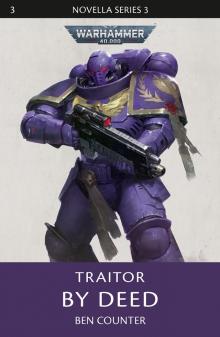 Traitor by Deed
Traitor by Deed Sacrifice
Sacrifice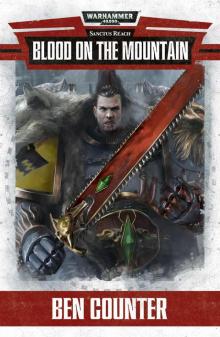 Blood on the Mountain
Blood on the Mountain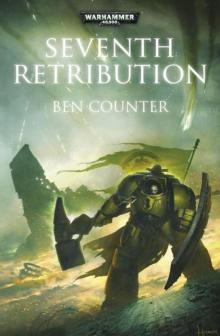 Seventh Retribution
Seventh Retribution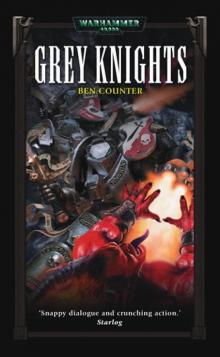 Grey Knights (Warhammer 40000)
Grey Knights (Warhammer 40000)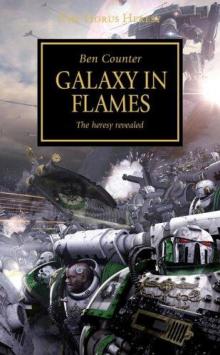 Galaxy in Flames
Galaxy in Flames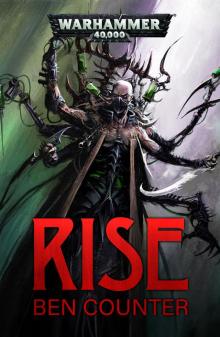 Rise – Ben Counter
Rise – Ben Counter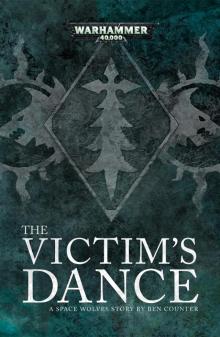 The Victim's Dance
The Victim's Dance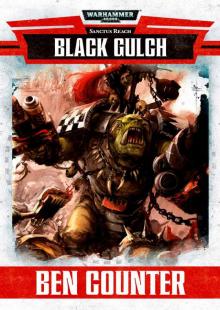 Black Gulch
Black Gulch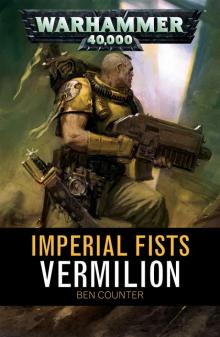 Vermilion
Vermilion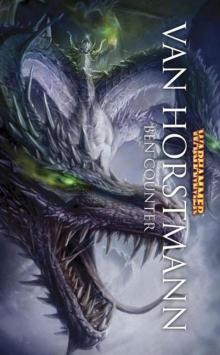 Van Horstmann
Van Horstmann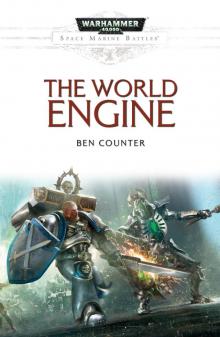 The World Engine
The World Engine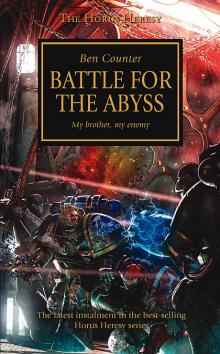 Battle for the Abyss
Battle for the Abyss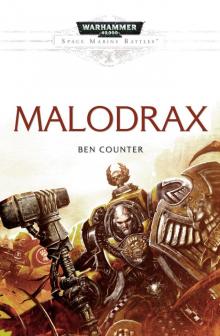 Malodrax
Malodrax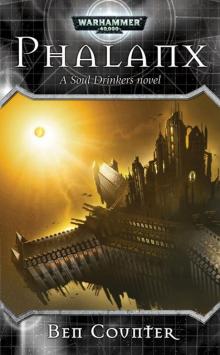 Soul Drinkers 06 - Phalanx
Soul Drinkers 06 - Phalanx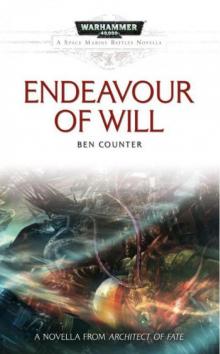 Endeavour of Will
Endeavour of Will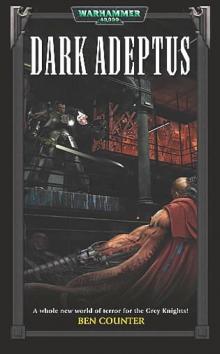 Dark Adeptus
Dark Adeptus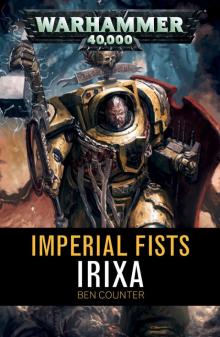 Irixa
Irixa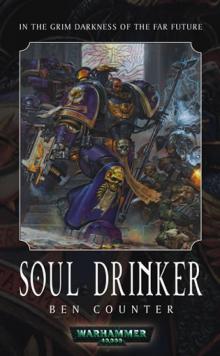 Soul Drinker
Soul Drinker